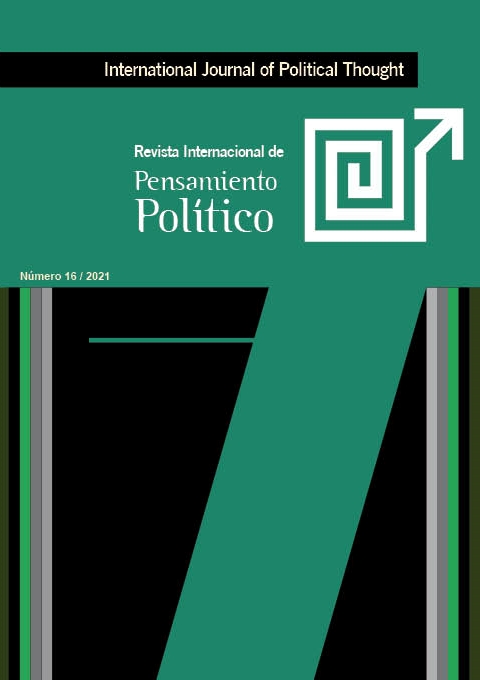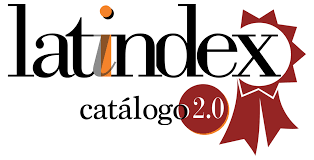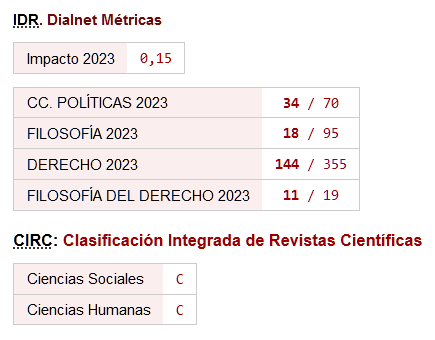Repensando las teorías de las Relaciones internacionales a colación del fracaso de EEUU en Afganistán. Una mirada materialista ecléctica
DOI:
https://doi.org/10.46661/revintpensampolit.6360Palabras clave:
Afganistán, EEUU, realismo, liberalismo, teorías críticas, materialismo eclécticoResumen
El interés de esta investigación radica en repensar las teorías de las Relaciones Internacionales a colación del fracaso de EEUU en Afganistán. No se trata de un análisis exhaustivo del conflicto en sí, sino de un intento por comprender el conflicto desde las teorías (neo)liberales, (neo)realistas y críticas. Mi conclusión es doble, por un lado propongo y defiendo que, –al igual que el (neo)liberalismo y el (neo)rrealismo se basan a fin de cuentas en una suerte de eclecticismo epistemológico y ontológico a la hora de planificar las acciones en política internacional–, las teorías críticas emancipatorias deberían apostar por un eclecticismo crítico materialista –más allá de las excepciones idealistas– con el objeto de superar el fraccionalismo teórico-práxico de los movimientos sociales y de los Estados subalternos; Por otro lado afirmo que el fracaso de EEUU en Afganistán y el advenimiento Talibán, fue debido, entre otras cosas –inseguridad permanente, corrupción generalizada y malas prácticas de las tropas ocupantes–, al desconocimiento de la subjetividad cultural de la población afgana que gira en torno al islam y a sus preceptos irracionalistas.
Descargas
Citas
Acemoglu, D. (Aug 20, 2021) Why Nation-Building Failded in Afghanistan. Project Syndicate. https://www.project-syndicate. org/commentary/afghanistan-top-down-state-building-failed-again-by-daron-ace-moglu-2021-08 (Consulta: 10/09/2021)
ACNUR (12 de octubre, 2021) La crisis en Afganistán se agrava con la bajada de las temperaturas. Naciones Unidas [Nota informativa]. https://news.un.org/ es/story/2021/10/1498282 (Consulta: 20/10/2021)
Aznar, J.M. (10 de septiembre, 2021) Entrevista a José María Aznar por John Muller. ABC. https://www.abc.es/espana/ abci-jose-maria-aznar-11-s-mas-atenta-do-acto-guerra-202109100053_video. html (Consulta:10/09/2021)
Barbé, E. y Soriano, J.P. (2015) "Del debate neorrealismo-neoliberalismo a la (Re) construcción del discurso dominante en relaciones internacionales", en C. del Arenal y J.A. Sanahuja (coords.) Teorías de las Relaciones Internacionales, Madrid, Tecnos, p.e. 127-156.
Bernabé, M. (2012) Afganistán: Crónica de una ficción, Barcelona, Debate.
Carr, E.H. (2004) La crisis de los veinte años (1919-1939), Madrid, Catarata.
Arenal, C. y Sanahuja, J.A. (Coords.) (2015) Teorías de las relaciones internacionales, Madrid, Tecnos.
Cox, R. (1981) "Social Forces, States and World Orders: Beyond International Relations Theory" en Millennium: Journal of International Studies, vol.10, nº2, p.e.126-155. https://journals.sagepub. com/doi/abs/10.1177/03058298810100 020501
https://doi.org/10.1177/03058298810100020501
Cox, R. (1983) "Gramsci, Hegemony and Internacional Relations: An Essay in Method", en Millennium: Journal of International Studies, vol.12, nº2, p.e. 162-175. https://journals.sagepub.com/doi/abs/10.1 177/03058298830120020701
https://doi.org/10.1177/03058298830120020701
Gilpin, R. (1981) War and Change in World Politics, Cambridge, Cambridge University Press.
https://doi.org/10.1017/CBO9780511664267
Gramsci, A. (1981) Cuadernos de la cárcel, México, Era.
Grasa, R. (2015) "Neoliberalismo e institucionalismo. La construcción del liberalismo como teoría sistémica internacional", en C. del Arenal y J.A. Sanahuja (coords.) Teorías de las Relaciones Internacionales, Madrid, Tecnos, p.e. 97-125.
Hakami, A. (2010) Crisis política y económica en Afganistán [Tesis de doctorado, Universidad Complutense de Madrid]. https://eprints.ucm.es/id/eprint/11189/
Hardt y Negri. (2002) Imperio, Barcelona, Paidós.
Hardt y Negri. (2007) La Multitud y la Guerra, México, Era.
Hobsbawm, E. (2003) Historia del Siglo XX, Barcelona, Crítica.
Huntington, S. (2001) El Choque de las civilizaciones y la reconfiguración del orden mundial, Buenos Aires, Paidós.
Independent (August, 16, 2021) Bush rompe el silencio sobre la retirada de Afganistán e insiste en que el 'sacrificio' no fue en vano. Independent. https://www. independentespanol.com/politica/ee-uu/afganistan-bush-tropas-talibanes-biden-b1904268.html (Consulta: 04/09/2021)
Keohane, R. (1988) "International Institucions: Two Approaches", en International Studies Quarterly, vol. 32, nº4, p.e. 379-396. https://doi.org/10.2307/2600589
Kissinger, H. (August 25, 2021) Why America failed in Afghanistan? The Economist. https://www.economist.com/by-invitation/2021/08/25/henry-kissinger-on-why-america-failed-in-afghanistan (Consulta: 10/09/2021)
Miller, L. (November 17, 2021) Afghanistan 2001-2021: U.S. Policy Lessons Learned. Internacional Crisis Group. [Testimonio] https://www.crisisgroup.org/asia/south-asia/afghanistan/afghanistan-2001-2021-us-policy-lessons-learned (Consulta: 27/11/2021)
Molina, E.M (2018) La Filosofía Política de Toni Negri, Sevilla, Atrapasueños.
Molina, E.M (2019) "El concepto de hegemonía en las relaciones internacionales: una crítica a Andreas Antoniades" en Revista Internacional de Pensamiento Político, Vol.14, p.e. 427-436. https://doi.org/10.46661/revintpensampolit.4827
Moravcsik, A. (1997) "Taking Preferences Seriously: A Liberal Theory of International Politics", en International Organization, vol.51, nº4, p.e. 513-553. https://doi.org/10.1162/002081897550447
Moure, L. (2015) "El realismo en la teoría de las relaciones internacionales: génesis, evolución y aportaciones actuales", en C. del Arenal y J.A. Sanahuja (coords.) Teorías de las Relaciones Internacionales, Madrid, Tecnos, p.e. 61-95.
Said, E. (16 de octubre, 2001) El choque de ignorancias. El País. https://elpais.com/diario/2001/10/16/opinion/1003183207_850215.html
Salomon, M. (2002) "La teoría de las relaciones internacionales en los albores del siglo XXI: diálogo, disidencia, aproximaciones", Revista Electrónica de Estudios Internacionales (REEI), vol. 4, p.e. 1-59. http://www.reei.org/index.php/revista/num4/articulos/teoria-relaciones-internacionales-albores-siglo-xxi-dialogo-disidencia-aproximaciones
RNE. (18 de agosto, 2021) Entrevista a Joseph Borrell. RTVE. https://www.rtve.es/noticias/20210818/borrell-ocurrido-afganistan-derrota-del-mundo-occidental/2160740.shtml (Consulta: 25/08/2021)
Sanahuja, J.A. (2015) "Los Desafíos de la Teoría Crítica de las Relaciones Internacionales", en C. del Arenal y J.A. Sanahuja (coords.) Teorías de las Relaciones Internacionales, Madrid, Tecnos, p.e. 157-188.
Sanahuja, J.A. (2018) "Reflexividad, Emancipación y Universalismo: Cartografías de la Teoría de las Relaciones Internacionales" en Revista Española de Derecho Internacional, vol. 70/2, julio-diciembre, p.e.101-125. http://www.revista-redi.es/ wp-content/uploads/2018/08/5_estudios_ reflexividad_emancipacion_universalismo_sanahuja-1.pdf
https://doi.org/10.17103/redi.70.2.2018.1.04
Soriano, R. y Mora, J.J. (2006) Los Neo-conservadores y la Doctrina Bush, Sevilla, Aconcagua.
The White House. (16 de agosto, 2021) Declaración del presidente Biden sobre Afganistán. The White House. https:// www.whitehouse.gov/es/prensa/discursos-presidenciales/2021/08/16/declaraciones-del-presidente-biden-sobre-afganistan/ (Consulta: 25/08/2021)
U.S Departament of State. (2020) Agreement for Bringing Peace to Afghanistan between the Islamic Emirate of Afghanistan which is not recognized by the United States as a state and is known as the Taliban and the United States of America. Recuperado de https://www.state.gov/wp-content/uploads/2020/02/Agreement-For-Bringing-Peace-to-Afghanistan-02.29.20. pdf (Consulta: 25/08/2021)
Watson Institute. (2021) Cost of War. Recuperado de https://watson.brown.edu/costsofwar/figures/2021/WarDeathToll (Consulta: 10/09/2021)
Descargas
Publicado
Cómo citar
Número
Sección
Licencia
Derechos de autor 2022 Eduardo Manuel Molina Campano

Esta obra está bajo una licencia internacional Creative Commons Atribución-NoComercial-CompartirIgual 4.0.
Política de acceso abierto
Se permite el acceso libre y abierto de cualquier interesado a todos los contenidos de los números de la revista, sin costo alguno, pudiendo imprimir y trasladar todos los artículos, con la única condición de precisar la fuente y la autoría.
La revista: a) no cobra a las autorías costes por el procesamiento de los artículos ni por el envío de los mismos, b) mantiene el copyright para los autores sin restricciones, c) facilita a los autores conservar sus derechos de publicación sin limitaciones.
La Revista Internacional de Pensamiento Político es una obra original del Laboratorio de Ideas y Prácticas Políticas de la Universidad Pablo de Olavide. Todos los artículos incluidos en la Revista son obra original de sus respectivas autorías. Esta Revista se ofrece libremente a la comunidad científica y académica sin coste alguno y libera los contenidos de acuerdo a la licencia "Reconocimiento-NoComercial-CompartirIgual 4.0 CC BY-NC-SA" del proyecto Creative Commons dispuesta en la siguiente url: https://creativecommons.org/licenses/by-nc-sa/4.0/legalcode
Si deseas traducir o compilar alguno de los artículos aquí disponibles, por favor, ponte en contacto













